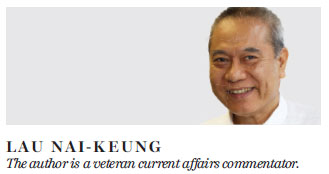Identifying the English elephant in the Asian room
Updated: 2015-11-11 09:09
By Lau Nai-keung(HK Edition)
|
|||||||
The other day in the South China Morning Post (SCMP) columnist Michael Chugani ironically reminded us that our city's self-styled "democrats" are always right. Chugani may have the sense to mock the so-called "democrats", but the paper he writes for often takes them at face value. That is why when one of them, Claudia Mo Man-ching, opined that Hong Kong had slipped down an English proficiency index for the second year in a row because of the "mother-tongue teaching policy", the SCMP felt obliged to spread the word in such a way as to suggest opinion is indisputable fact.
The SCMP quoted Mo as saying, "If Hong Kong scored 10 out of 10 in the past, now it only has 6." That almost makes a mockery of the efforts of EF English First, the Swedish-owned international English training institution that compiled the proficiency index: Why go to all the trouble of doing the survey if a newspaper gives equal weight to someone who rattles a number off the top of their head?
The SCMP justified featuring Mo prominently in the story by telling us that she is "a proficient English speaker herself". If our city's self-styled "democrats" are always right, those who speak English well must certainly be infallible.
Language and education are two recurring subjects in this column. To me, they are the roots of many if not most of Hong Kong's current problems. When it comes to decolonization, language and education are also the most urgent issues that we must tackle. Concerns over Hong Kong people's worsening English proficiency, which resurface every now and then, best demonstrate some of our society's misconceptions.
According to Mo, after the government's "mother-tongue teaching policy" was introduced in 1997, those who had the resources sent their children either to international schools or to local schools that teach in English, before sending them to overseas universities. "Those who could not enter these schools faced rote learning and drilling," she added.
Mo talks as if "those who had the resources" send their kids abroad merely because of the "mother-tongue teaching policy", which is a cute idea. As to "rote learning and drilling", that is the Territory-wide System Assessment debate all over again. We are Asians. We are competitive.
Mo is known for her "localist" political stance. While "localists" claim that they love their mother tongue and will protect it against the spread of Putonghua, they are also ambivalent as to whether they prefer English or Chinese. Perhaps some of them think English is their mother tongue. Who knows what the effect of 100 years of colonialism can be on people?
In recent years, I have come across an increasing number of young mainlanders educated in Chinese schools and universities who can write and speak very good English. Many of them have attained a level of English much better than the average Hong Kong person. Naturally, when Mo - and the SCMP - blamed the "mother-tongue teaching policy" for the decline of Hong Kong's English standard, I was interested to know how we fare compared to our compatriots on the mainland.
Just as I was about to look for the information on Google, I realized that it was all there in the same article. According to a chart compiled by the SCMP, Hong Kong scores lower than Taiwan, Beijing and Shanghai. What is even scarier is the fact that this is not even the first time we are behind these cities. Last year, even Tianjin was ahead of us. Have they all given up on their mother tongue?
We should not take rankings seriously, and certainly not this specific one compiled by EF English First, which has major methodology shortcomings. It really would not be something worth writing about, were it not for the China haters' ridiculous reactions. They are in effect saying that the survey is unreliable, but to the extent that it is of value, it tells us that the "mother-tongue language policy" is to be blamed. Can they first make up their minds?
In the past, colonialism was often an effective means to spread religion and education. We are now in the Internet age, and there are many other channels to learn foreign languages and access foreign ideas. Mainlanders may not use YouTube or Facebook, but they can watch an almost unlimited amount of American TV series, or meiju, online for free. Why is it so surprising if they can also speak good English?

(HK Edition 11/11/2015 page9)